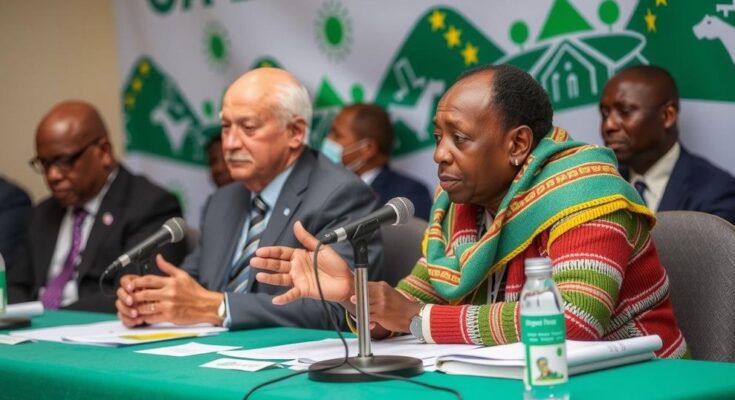During a visit to Lesotho, UN Secretary-General António Guterres urged wealthy nations to honor their climate finance commitments to developing countries. Highlighting Africa’s vulnerability to climate change despite its minimal contributions to global warming, Guterres called for immediate funding for adaptation efforts and the operationalization of the Loss and Damage Fund. He also advocated for increased representation of African nations in global governance, particularly the U.N. Security Council.
United Nations Secretary-General António Guterres recently addressed the Parliament of Lesotho, urging affluent nations to fulfill their financial commitments to assist developing countries combat the adverse effects of climate change. During his visit, Guterres emphasized the need for rich countries to deliver on their pledge of at least $300 billion annually, which was agreed upon in the recent U.N. climate talks in Azerbaijan, though it falls short of the $1 trillion requested by developing nations. He pointed out that landlocked and least developed countries, such as Lesotho, are particularly vulnerable to climate impacts.
Guterres referenced the dire situation in Southern Africa, where extreme drought has led to a hunger crisis affecting over 27 million individuals. He noted that African countries, while contributing minimally to global warming, experience some of the severest consequences. As an additional focus, Guterres called for the swift operationalization and generous funding of the Loss and Damage Fund aimed at compensating nations affected by climate-induced disasters.
Furthermore, Guterres reiterated his hope for Africa to gain permanent representation on the U.N. Security Council by the end of his tenure in December 2026, highlighting the historical exclusion of African nations from global decision-making processes as a relic of colonialism. Following his parliamentary address, Guterres plans to visit the Katse Dam, integral to Lesotho’s water resource management efforts. Overall, Guterres’ visit underscores the urgent call for international solidarity in addressing climate change impacts on vulnerable nations like Lesotho.
The issue of climate finance for developing countries has gained heightened visibility, particularly in the context of ongoing global challenges including climate change, extreme weather events, and natural disasters. With Africa contributing minimally to global emissions but being one of the hardest-hit regions, there is a pressing need for developed nations to fulfill financial commitments made during international climate agreements. The U.N. climate talks in Azerbaijan resulted in an agreement to mobilize $300 billion annually for climate adaptation and mitigation strategies in poorer countries, which many argue is still insufficient given the scale of the crisis. Guterres’ comments also reflect a broader conversation about equitable representation for African nations in global governance structures, such as the U.N. Security Council.
In summary, Secretary-General António Guterres’ visit to Lesotho exemplifies the urgent call for developed countries to uphold their financial commitments to support vulnerable nations in the face of climate change. His remarks highlight the disparities in global governance and the critical need for African representation. As Southern Africa grapples with severe drought conditions impacting millions, the international community’s response will be crucial in mitigating further humanitarian crises. Guterres’ advocacy for immediate climate finance and the establishment of robust support mechanisms reaffirms the significance of collaborative efforts to combat climate challenges effectively.
Original Source: www.independent.co.uk




